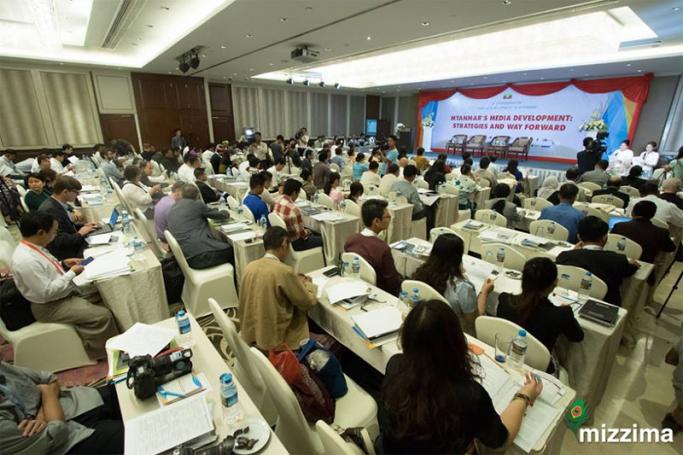Accuracy, impartiality and fairness were keys to achieve ethical journalism, said May Thingyan Hein, CEO of Myitmakha Media at the 6th Media Development Conference at Chatrium Hotel on Thursday.
She also pointed out three challenges of working in media - the time, the money and the sources at times when the media business is going down.
Reporting impartially is a struggle in Myanmar as the military had restrictions on the access of journalists to conflict areas like Rakhine state, according to U Zayar Hlaing, Chief Editor at Mawgun Magazine. “The law is in the book, but is not enforced,” he said.
Another hindrance for journalists to practise their profession is that the government is still publishing through two news media outlets. This makes it harder for private media to compete.
To overcome the hurdles, Mr Bambang Harymurti, former chair at the Indonesia Press Council, pointed out there were two keys: to report nothing but the truth and to minimize the harm.
He also pointed out a stark contrast of perspectives between the military and journalists. One is very conservative, and the other, very liberal. “It is important to know the different angles. The job of journalists is to help people see from many points of view.”
“We need to also see beyond our selfishness and pride to provide impartial information,” May Thingyan Hein said. To achieve fairness, May Thingyan Hein stressed that journalists ought to have acceptance and understanding for other people to avoid discrimination. A lot of training is needed as well.
Some of the issues discussed on the panel included the role of Myanmar’s press council in addressing issues of journalistic ethics. And its role in the fair representation of views on media coverage globally and locally.
In the second session of the conference, Nwe Zin Win, the Executive Director at Pyi Gyi Khin said that the draft of the access to information law is to be debated in the next session of parliament.
One of the biggest challenges of drafting the law was forming an information commission. “The Ministry of Information cannot be a part of the commision, it should be independent from the government,” said Nwe Zin Win.
“It has been a dynamic drafting process, but we must move forward with the law,” said Toby Mendel, Executive Director at Centre for Law and Democracy. Drafting the law, according to him, was also a very rewarding procedure. “[With more access to information,] the citizens will be happier and the government will enjoy better relationships with the citizens, too,” he added.
Apart from public interest, national security was their concern as well, according to Mendel.
Some ethnic media groups discussed how they had contributed to peacebuilding at the conference on the third panel. “Ethnic media has an important role. As we see how the tribes suffer directly, we’re like the watchdogs,” said Mai Naing Naing Oo, Chief Editor at Managar Journal.
Ethnic media do face a lot of impediments, according to Nan Paw Gay, Chief Editor at Karen Information Centre, one of them being the language barrier. “If we have the same culture and language, we can do that. But if the ethnic people don’t understand Myanmar language, it’s very challenging,” said Nan Paw Gay.
She also added that they were striving to create more dialogue with the government on issues like the protection of journalists as well as the conflicts involving ethnic armed groups.
The representatives of ethnic news media concluded with a message: “We’re not fighting the government, we are not fighting the ethnic armed groups either. We’d like to focus on the fact that people are suffering.”
Telling the truth with minimal harm - experts discuss journalistic ethics and challenges
07 December 2017
Telling the truth with minimal harm - experts discuss journalistic ethics and challenges












